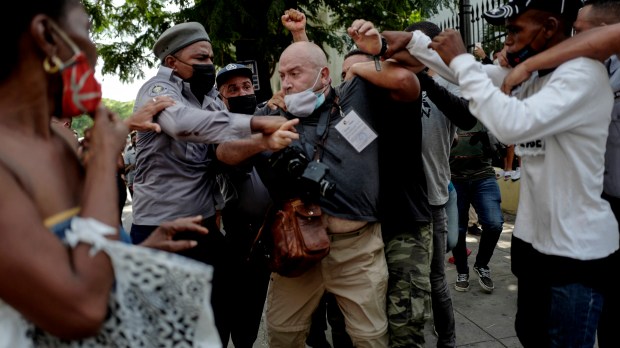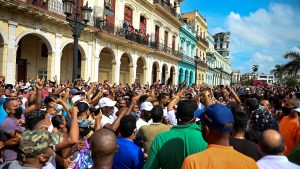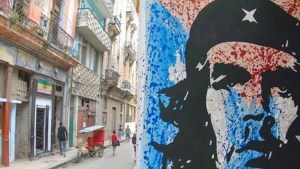Lenten Campaign 2025
This content is free of charge, as are all our articles.
Support us with a donation that is tax-deductible and enable us to continue to reach millions of readers.
A leader of Cuba’s Christian Liberation Movement said that Sunday’s nationwide street protests against the regime in Havana were the beginning of change for the communist-run country.
Manuel Robles Villamarin, one of the leaders of the movement begun by Cuban dissident Oswaldo Payá Sardiñas, said he was proud to see thousands of Cubans turn out on the streets Sunday for what appears to have been spontaneous protests. Robles doesn’t expect it to be the end, even though the protests reportedly were met with a harsh response from authorities and many people were arrested.
“If they did that on Sunday, they will keep doing that, for sure,” Robles said in an interview. “I believe this is the beginning of change.”
The Christian Liberation Movement, known as MCL for its Spanish name Movimiento Cristiano Liberación, was founded in 1988 by Payá to fight in a peaceful way for freedom and human rights. Payá, a Catholic and a recipient of the European Union’s Sakharov Prize, along with another leader of the movement, Harold Cepero, died in 2012, in an automobile accident that is widely regarded as suspicious.
Robles, 31, who was born and reared in Havana, said that he had the chance to attend World Youth Day in Madrid in 2011, and while there he felt a call to return to Cuba to join the fight for freedom. He said Payá asked him to join his movement. But because he took a leadership role, he was persecuted by the government, he said, including being dismissed from university. He was admitted to the United States as a political refugee in 2014, and has since studied in Miami.
He said the MCL hopes to become a political party, if and when Cuba allows more than just the ruling Communist Party.
‘People are fed up’
Sunday’s protests are said to have begun because Cubans are desperate over economic and social issues: a failing economy, a dearth of food in the stores, a lack of medicines in hospitals and clinics, and a very poor handling of the COVID-19 pandemic.
But cries for freedom and a change from the long-ruling regime were front and center in the marches as well.
“People are fed up,” Fr. Carlos Peteira, an Argentine priest who has served as a missionary in Cuba for several years, told Aleteia by email. “The reality of Cuba we see every day in our communities, from the most humble in the countryside to the despair of the city, is that shortages are pressing and despair is growing.”
Fr. Peteira was concerned about the speech President Miguel Diaz-Canel made on national television in response to the protests, which he termed “reckless and dangerous.”
“The most serious thing is that he encouraged combat between communists and revolutionaries vs. counterrevolutionaries,” the priest said. “In short — and this is the fearful thing — of Cubans against Cubans, of those who embrace communism, the majority out of interest, fear or habit, and on the other hand, those who commit the terrible subversive act of thinking differently.”
Immediately, he said, security forces repressed peaceful protesters, including beating them.
Robles was also concerned about the “violent repression.” The president “called on people to hit other Cubans,” he said. “He is putting Cubans against Cubans. That is civil war.”
He said that two of his friends, journalists who believed in the cause of freedom, likely were arrested. Robles had not heard from them by Wednesday morning.
The United States Commission on International Religious Freedom (USCIRF) denounced the detention of religious leaders during the protests in Cuba.
“Cuban authorities are detaining religious leaders merely for peacefully protesting and calling for greater respect for human rights,” USCIRF Commissioner James W. Carr said in a statement Tuesday. “Principal among human rights concerns in Cuba are the ongoing and systematic violations of religious freedom, which include the persistent intimidation and harassment of religious leaders.”
Authorities reportedly assaulted Fr. Castor José Álvarez Devesa and detained him incommunicado in Camagüey. Fr. Álvarez has received backlash for his criticism of the Cuban regime and calls for greater religious freedom in Cuba, including in a 2018 open letter to then President Raúl Castro. Fr. Álvarez was later released.
Hope for the future
Asked about what vision MCL has for Cuba if change eventually comes, Robles said the first thing is to get the government, with the help of international pressure, to “give the people freedom and listen to the people.”
“The government is there to serve the people,” he said. It doesn’t have “the right to practice violence against the people only because they are asking for change. We need a dialogue, we need new elections, a new constitution, a renewal of our laws. We need a lot of work. We will need a lot of international help.”
Robles commented that Sunday’s protests were “an answer to my prayers and the prayers of many people of goodwill.
“We were hoping for a long time that the good people of Cuba would take to the streets and ask for the human rights they deserve,” he said. “I won’t say tomorrow we will get freedom. I wish. But there is a lot of hope for me right now.”



